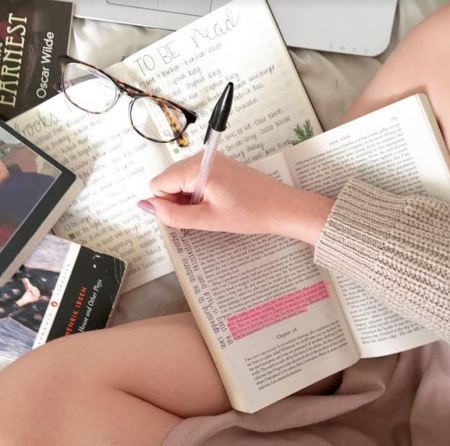
Hi everyone!
If you saw last week’s babble, you’ll know that I’m making a few changes to this blog, the main one being I post more “personal” blog posts alongside the bookish ones. Well, here’s the first.
When mentioning college or university, I always feel like I have to explain why I’m a year older than I “ought” to be – why I stayed behind a year. The English education system pretty much sets your path out for you – GCSE’s → A Levels → University – and it seems odd when people start straying off and doing their own thing. With my mentioning of so many subjects on social media, it’s just a whole mash of confusion I feel I ought to clear up. And so, here we are.
This is going to be quite a babble, I’ll warn you of that right now. I’ll condense it as much as I can, but I’ll be explaining how I did A Levels and BTEC, comparing the two, and also writing a bit on how I still struggle to come to terms with the stigma and having to give up A Levels. So it might take a while. But, if you’re interested…here’s the basics!
![]()
So a quick explanation to the title – “that’s English college, by the way” – there’s a massive variety of education systems across the world, and when I mention college people often think I mean the American version of our Universities. So for a bit of guidance, here in England, we can leave school at 16. Then we go on to do two years at college – a new building – (which most do), or sixth form – still in school, but at a higher level. It’s basically just doing a higher level course and being separated from those still doing GCSE’s.

Cue my start to A Levels. When studying A Levels, you have to choose three or four subjects to study. I chose three – English Literature, History, and Fine Art. I also applied for English Language, but dropped it before I started once finding out we only *had* to study three and studying four was just an extra option. I much prefer reading texts and analysing the content, not how specific words are used and whatnot. So goodbye English Language.
And for those interested, a brief insight to what I studied under these subjects:
English Literature – Our main texts were Jane Eyre by Charlotte Bronte, Tess of the D’urbervilles by Thomas Hardy and A Doll’s House by Henrik Ibsen. We also studied poetry by Tennyson and a few random ones, and briefly delved into Oscar Wilde.
History – Split into two modules. The main one we studied was Italian and German Unification, and the smaller module focused on World War II.
Fine Art – A lot of practicing with different materials, and for our project I believe we were all given a word and we had to create a whole sketchbook worth of work based off that word. I can’t actually remember it that well, oops. My final piece had something to do with maps though, I remember that much.
I absolutely loved A Levels. I remember feeling like I was in my element. I enjoyed what I studied, and that makes all the difference. I’m not going to mind working well into the night, or spending hours trying to remember key dates and names, if I enjoy what I’m learning.
But exams came around, and I don’t get along well with them at all. It’s an anxiety thing (though we didn’t know that at the time). And I remember this day so well – the day I had my history exam, and completely failed it. I knew instantly. I couldn’t understand the question, and nearly started crying in my seat, just staring at the page. I forced myself to write something – just a small something, at least – but when the exam was over I left the room and burst into tears, saying to someone in my class “I’ve failed.”
Come results day, I was right.
So what now? I could have continued my A Levels. I would have had to drop History, and pick up another subject. But that means I would have to stay behind a year anyway, my final year used to study just the one subject I picked up to replace History. And there were no other subjects I wanted to do at that point. Plus, I’d started to really, really hate Fine Art (that topic is for another day), so I didn’t want to study that anymore. And on that day I panicked. So, SO much.
Because you see, as mentioned in the intro, the English education system sets it out for you. The key path is to go and study your A Levels, then go to University. And for years now, I knew I wanted to study Literature at University. It’s the only thing I was aiming for. So failing my A Levels to me was a disaster – how would I get to uni now?

In the end, I picked up a BTEC. The main differences between these and A Levels being you only study one subject, and it’s all coursework, no exams. So I studied Journalism – or Creative Media and Social Media Communications, if you want the fancy title.
It took me a long while to figure out that I could still actually go to university with this.
Again, for those interested, my first year in Journalism consisted of learning the ways of the industry; journalistic laws, developing our writing, photography, film, and editing skills, etc etc. The second year was a lot like completing a uni dissertation – we chose our own topic, and did a heck of a lot of research into writing an essay about it. Thanks to the “social media communications” part of the course, I managed to focus mine back onto books – my project was on how social media has affected the publishing industry. I sang many praises for us in the online book community, don’t you fret.
I ended up hating the course by the end of it – again, that’s for another blog post – but what matters now is that I’ve completed it, got the grades, and I’m finally off to university.
But you see, I still struggle with the fact that I had to give up A Levels. Thanks to the English education system setting out this path for everyone to follow, any other courses or paths followed don’t seem as much as a success in society. There’s a huge stigma against BTECs. People don’t deem them as hard work, but instead they’re the courses “dumb people” take. And granted, I’ll freely admit that in terms of workload, BTECS are easier than A Levels. Like I said, you only study one subject, and there’s no exams.
But that doesn’t mean it’s easy. A lot more independence and self motivation is needed, since you’re not in college as often, being told what to do. The work itself is hardly easy. And in my personal experience, the grading system was actually so much harder to work towards in BTECs than A Levels. Instead of rounding the grades from different units up to a suitable number, we got our lowest grade no matter what. So if we got the top grades in every unit, but completely failed one of them – tough luck buddy, you’ve failed.
It’s funny, really, how a different grading system can make people judge so harshly. I by no means consider people who study BTECs to be of a lower intelligence just because it’s not A Levels. And yet, I judge myself so harshly for that very same reason. Isn’t that always the way? I know how freakin’ hard I worked through those two years, and yet still feel a pang of shame when people say “oh what A Levels did you study?!” and I have to correct them with “oh…er…actually I did a Journalism course.” Every time, the other person’s face is just that “…oh” reaction. It’s hard not to feel dumb when every single time the topic comes about, people are suddenly not impressed any more.
And this is where I turn into a hypocrite. Because I want to say that if you’re not studying A Levels, and are doing some other course – whether that be a BTEC or some other name – do not let that stigma get to you. It’s just a different grading system, not a downgrade to your intelligence. As much as I still struggle with that idea of myself, I don’t want you guys to. Because it’s simply a result of the english system shining a light on this wonderful golden pathway they set, not caring enough to point out the other paths that stem off that too. You’ll get to where you want to be either way. It’s your choice, and that’s what counts.
And so, we reach the end of this very, VERY long babble.
If you’ve stuck through it and reached the end, then honestly round of applause to you. How you got through that boring ramble, I don’t know.
If you have any questions about something I’ve mentioned, feel free to leave a comment! Or if you want to share your own experiences, or just have anything to comment in general, I’d love to hear!
But for now…
Until next time

Come and visit me!






I’m not from the UK but I’m writing a book that’s set in the UK and my characters are in college, too, so I knew a bit about the system already. I think you’re right. Not taking your A-levels or failing them doesn’t mean you’re any less intelligent. And I also believe in the fact that there is no “right path”. Taking another one doesn’t mean you can’t be successful. Just think of Oprah or Bill Gates. They never finished university, but that didn’t stop them. It sucks that people are quick to judge, though.
PS: Have you ever read Radio Silence? I’ve just finished it and it deals with expectations when it comes to the education system. It’s done really well I think.
LikeLiked by 1 person
It really does suck! So many people have proved that you don’t need to follow the path set out to be successful. I wish people would remember that more!
I’ve not read Radio Silence purely because I tried the author’s other book, Solitaire, and didn’t get along with it too well 😆 I might try it one day though, if I ever fancy a contemporary read!
LikeLiked by 1 person
I completely agree with you! I studied English Language and Literature, History and Geography at A Level, but there were perfectly good Journalism/Other English related courses available that I wanted to take but ALL my teachers told me not to do a course because it “doesn’t look as good” for uni applications, which is sad that even the stigma is there amongst teachers 😦 This is such a great blog post and the only way to end stigma is to talk up about these issues!! I’m so glad you managed to get a place at university like you wanted, especially when you could have so easily given up because of the system in place. Definitely keep posting these ‘personal’ posts – I’m sure many people will find them super helpful! 🙂 Marie x
LikeLiked by 1 person
I’m actually surprised your teachers would say that to you! I mean, you can tell they all think it but usually they just “subtly” try to guide you towards A Levels ahaha 😆
And thank you so much!
LikeLike
I keep feeling like I need to justify why I’m only going into my first year as opposed to my third this year, but it’s a complicated story haha. Like you, I swapped subjects after my first year – but not the extent that I dropped A-Levels. Having done them for so long and struggled with them in my own way (history was hell, biology got extremely hard, and the exams? Don’t get me started on how little sense they make to me) I can definitely appreciate and respect people like yourself who do what’s best for them. So what you did a BTEC? You still passed it! You still have a qualification! And at the end of the day, it’ll be how you fare at uni, not what you did at college, that’s important to your degree.
LikeLiked by 1 person
I feel like most people’s university/college stories are long at this rate, no one quite knows what to do anymore 😆 Just gotta remind myself of everything you’ve just said basically – I got into uni, who care how I got there? 😆
LikeLike
There are so many things I would change in Britain’s education system!
It is good that you know what career you want to go into this early, I didn’t know till my penultimate year of university! I actually did uni part time so I avoided the thousands of pounds worth of student debt, so alternative education paths do have their advantages.
Good luck at uni! 🙂
LikeLiked by 1 person
Ahh wouldn’t we all want to change it? ahaha 😆
I’ve only recently found out I want to go into publishing, but there’s literally nothing else I want to do so I’ll be a tad screwed if that doesn’t work out, oops. Industries are forever changing though! To be honest, I was always going to study Literature even if I had no clue what I wanted a career in – it’s the only topic I’ve been interested in enough to continue!
And thank you very much!!
LikeLiked by 1 person
I’m actually trying to get into publishing myself! It is a very competitive industry but I’m slowly getting there.. I have plenty to say on the publishing industry too but let’s not go there!!
but I’m slowly getting there.. I have plenty to say on the publishing industry too but let’s not go there!!
LikeLiked by 1 person
Yeah, it worries me how competitive it is! The amount of times I’ve been told that it’s difficult to get into, the degree I’m doing is pointless and I should look for something else is actually shocking. You’d think they’d try to encourage you. Glad to hear you’re getting there though! I hope it all works out 🙂
LikeLiked by 1 person
Pursue a career that interests you. That is what matters. I’ve interned at a few places now, and I am certain that this is what I want. Lots of people in publishing have an English degree so I can definitely say your degree isn’t pointless!
LikeLiked by 1 person
I always find it interesting to hear about other people’s experiences with the school/college system, my experience was confusing as I did three A Levels and one BTEC that equated to the same as an AS Level (it got very confusing…) I think it’s fantastic that you didn’t give up and that you’re going on to do what you really love, best of luck to you!
LikeLiked by 1 person
Thank you!
It’s funny how they’re always compared differently, like I was told my BTEC is equivalent to A Levels but then some are told it’s just an AS level. Maybe it’s something about the length of time they’re studied? I don’t know. I’ve not heard of that combination before though! What did you study? 🙂
LikeLiked by 1 person
Yeah it really is confusing trying to compare them (maybe the solution is to just stop trying to compare them!) I did English Literature, History and Law, plus a BTEC Subsidiary Diploma (I think that’s what it’s called? I’m still not too sure myself 😂) in Graphic Design. Provided I get the grades I’m hoping to do English and History at uni from September, it’s a scary time but really exciting too!
LikeLiked by 1 person
Very true ahaha! To be fair, there’s that many different grades within BTECs, it can’t really be compared anyway. And oooh that’s so interesting, I love knowing what people choose to study 😀 I’m sure you’ll get the grades you need – but good luck for the day anyway!!
LikeLiked by 1 person
ASHLEIGH…while I don’t live in the UK, I’m experiencing something similar. In Canada, there’s this expectation that you go to high school > university > work. And that’s what I did cause I thought that was the only option I had. We do have college in Canada (or community college as it’s referred to in the US), but no one ever talked about it in high school. Our school counsellors would only talk about college if you weren’t getting good grades. If you were getting A’s in your courses, then you immediately were put on the path towards university. My whole life I thought that if I went to university, I’d graduate and be able to start working right away. I didn’t realize until half way into university that that wasn’t the case and that if I wanted to study something I enjoyed WHILE working towards a career, college would be a better option. I could have totally dropped out of university at that point and gone to college (it would have saved me so much time and money), but I knew the second people found out they would stare at me in shock. So I decided that I would just go to college after I graduated from university. When people started asking me what my plans were after uni and I told them I was going to college, the expression on their faces was just full of disappointment, confusion, and disdain. They would say things like “isn’t that kind of backwards?” or “Oh, why college? Can’t you get a job straight from university?” or “College? Why didn’t you just go to college from the beginning then?” WELL…I would have if people talked about it more, and if there wasn’t so much stigma surrounding people who went to college instead of university. It sucks, but I’m glad I’m going anyway. I’ve stopped caring what people think cause they’ll never be completely happy anyways 🙂
LikeLiked by 1 person
Oh Sakina, I’m sorry you get those “looks” too 😦 I don’t get how anyone can judge you for wanting to learn something? Like that’s all it is – another method of learning. I don’t get it. I’m glad you’re happy with your choice now though ❤ I hope it all goes well for you!!
LikeLiked by 1 person